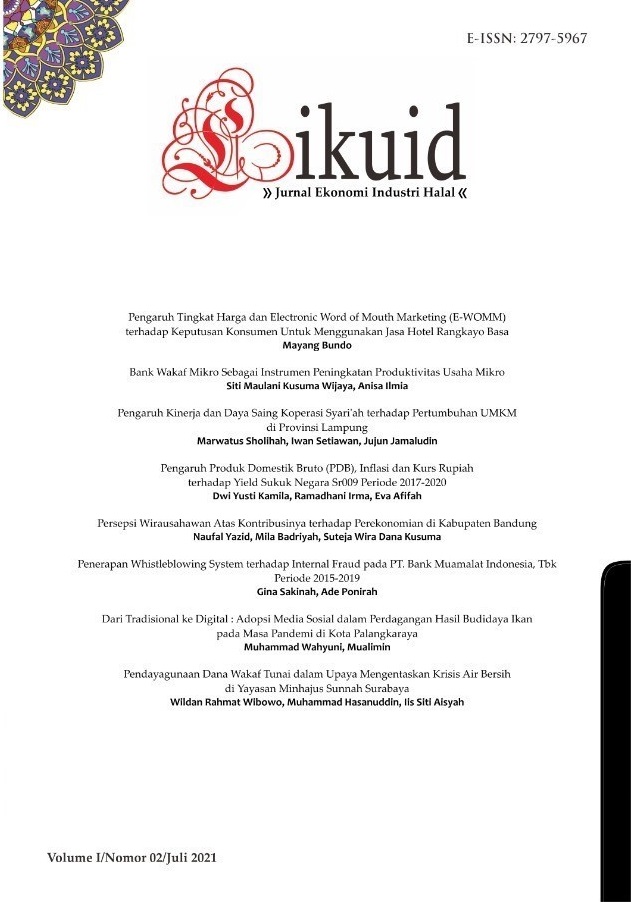BANK WAKAF MIKRO SEBAGAI INSTRUMEN PENINGKATAN PRODUKTIVITAS USAHA MIKRO
DOI:
https://doi.org/10.15575/likuid.v1i2.14156Abstract
Micro Waqf Bank (BWM) is a Sharia Microfinance Institution established by the OJK with the hope of reducing poverty levels in Indonesia. Bank Wakaf Mikro is present in the pesantren environment to provide financial access for the middle to lower class society in order to get access to capital without collateral and low yields. This paper is expected to provide new knowledge and insights regarding one of the Islamic economic instruments in the micro sector, namely the Micro Waqf Bank model. This paper was prepared through the method of library research using secondary data. From observations from various literatures, Micro Waqf Bank with access to capital is one alternative for improving the standard of living of micro-entrepreneurs to develop their businesses. The ease of the process, accompanied by training and mentoring, is believed to be able to encourage the independence of the middle and lower classes in running micro-businesses and boost productivity in the real sector. With the role of pesantren which has great potential to develop the surrounding area.
Keywords : Micro Waqf Bank (BWM), Micro business, Real sector, Sharia Microfinance Institutions
References
Mishkin, Frederic S. 2008. Ekonomi Uang, Perbankan, dan Pasar Keuangan. Edisi 8. Jakarta : Salemba Empat.
Mustari, Mohamad & Mohammad Taufiq Rahman. 2012. Ekonomi Pesantren (Manajemen Pesantren dalam Pembangunan Masyarakat Desa). Bekasi : Lintang Publishing
Prihatini. 2005. Hukum Islam Zakat dan Wakaf. Jakarta: Kerjasama Penerbit Papas Sinar Mentari dengan Badan Penerbit Fakultas Hukum Universitas Indonesia
Sule, Ernie Trisnawati, dkk. 2016. Manajemen Bisnis Syariah. Bandung : PT Refika Aditama
Jurnal
Baskara, I Gde K. 2013. Lembaga Keuangan Mikro Di Indonesia. Buletin Studi Ekonomi, Vol.18, (No.2), pp.114-125
Yakin, Nurul. 2014. Studi Kasus Pola Manajemen Pondok Pesantren Al-Raisiyah Di Kota Mataram . Ulma Jurnal Studi Keislaman.
Disemadi, Hari Sutra & Kholis Roisah. 2019. Kebijakan Model Bisnis Bank Wakaf Mikro Sebagai Solusi Pemberdayaan Ekonomi Masyarakat. Jurnal Law Reform Vol 15 No.2
Maadi, Alan Suud. 2018. Instrumen Bank Wakaf Mikro : Alternatif Pemberdayaan Ekonomi Pesantren.
Maulidiana, L. 2014. Fungsi Otoritas Jasa Keuangan Sebagai Lembaga Pengawas Perbankan Nasional Di Indonesia. Jurnal Keadilan Progresif, Vol.5, (1), pp. 102-120
Muttaqin, Rizal. 2016. Kemandirian Dan Pemberdayaan Ekonomi Berbasis Pesantren (Studi Atas Peran Pondok Pesantren Al-Ittifaq Kecamatan Rancabali Kabupaten Bandung Terhadap Kemandirian Eknomi Santri Dan Pemberdayaan Ekonomi Masyarakat Sekitarnya). JESI (Jurnal Ekonomi Syariah Indonesia). Volume I, No. 2 Desember 2011. pp 65-94
Internet
Siti Maulani, Anisa Ilmia, Bank Wakaf Mikro Sebagai Instrumen Peningkatan Produktivitas Usaha Mikro
Jurnal Likuid, Volume I Nomor 02 Juli 2021 28
Zuraya, Nidia. 2020. Jumlah Bank Wakaf Mikro di Indonesia Mencapai 56 Unit. Republika Online. Dapat diakses di : https://republika.co.id/berita/q5zmye383/ojk-resmikan-bank-wakaf-mikro-pertama-di-ntb
Badan Pusat Statistik. Dapat diakses di : https://www.bps.go.id/pressrelease.html?katsubjek =23&Brs%5Btgl_rilis_ind%5D=&Brs%5Btahun%5D=2019&yt0=Cari
Bahan Sosialisasi Publik OJK. 2018. Bank Wakaf Mikro : Program Pemberdayaan Masyarakat melalui Pendirian Bank Wakaf Mikro – LKM Syariah











